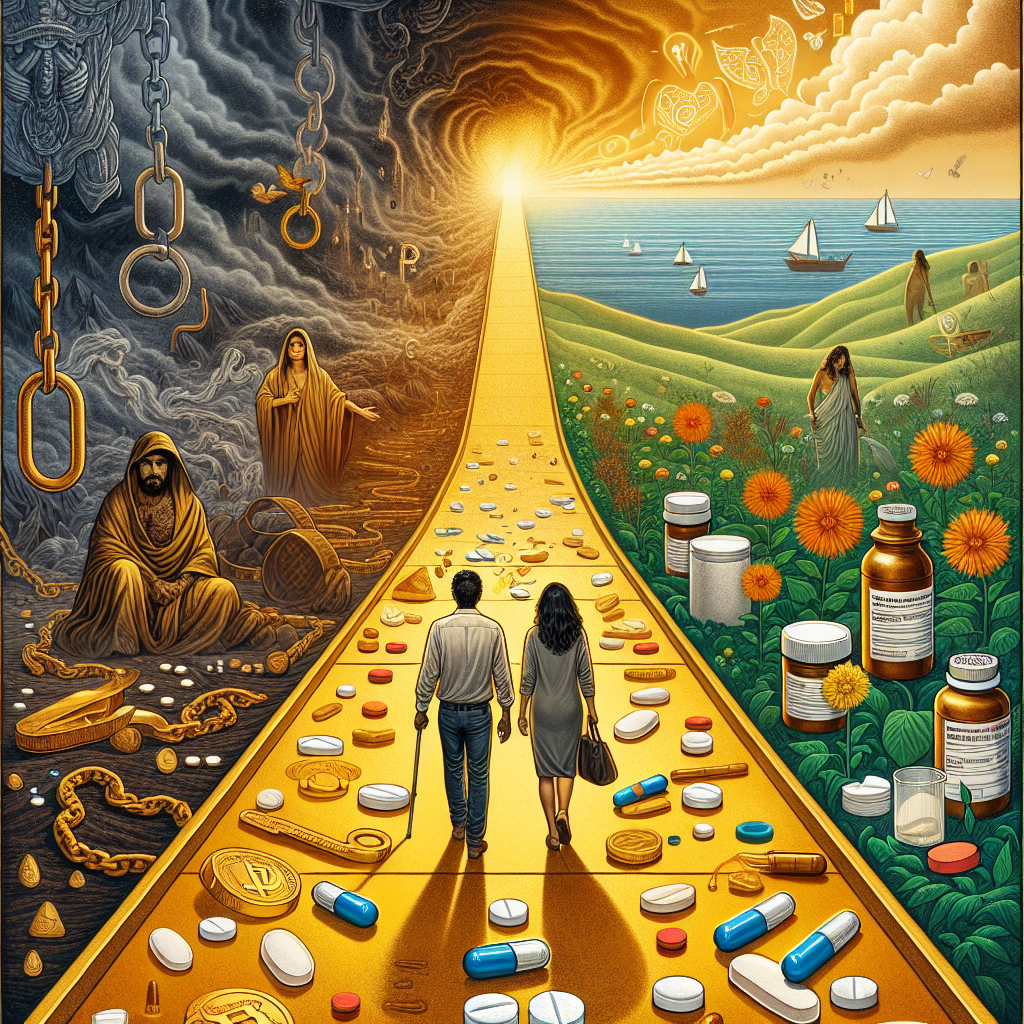-
Table of Contents

“Medication: A Pillar of Strength in the Journey to Addiction Recovery”
Introduction
The Role of Medication in Addiction Recovery
Addiction recovery is a multifaceted process that often requires a combination of therapeutic approaches to achieve lasting success. One critical component of this process is the use of medication, which can play a pivotal role in managing withdrawal symptoms, reducing cravings, and addressing co-occurring mental health disorders. Medications such as methadone, buprenorphine, and naltrexone are commonly used in the treatment of opioid addiction, while disulfiram, acamprosate, and naltrexone are employed for alcohol dependence. These medications work by altering brain chemistry, stabilizing mood, and helping individuals maintain focus on their recovery goals. When integrated with behavioral therapies and support systems, medication-assisted treatment (MAT) can significantly enhance the likelihood of sustained recovery, offering individuals a better chance at reclaiming their lives from the grip of addiction.
The Importance of Medication-Assisted Treatment in Overcoming Addiction
Medication-assisted treatment (MAT) has emerged as a cornerstone in the battle against addiction, offering a beacon of hope for countless individuals struggling to reclaim their lives. This approach combines the use of FDA-approved medications with counseling and behavioral therapies, creating a comprehensive treatment plan that addresses both the physical and psychological aspects of addiction. By understanding the importance of MAT, we can appreciate its transformative potential in overcoming addiction and fostering long-term recovery.
One of the primary benefits of medication-assisted treatment is its ability to alleviate withdrawal symptoms and reduce cravings, which are often significant barriers to recovery. Medications such as methadone, buprenorphine, and naltrexone have been proven effective in managing opioid addiction, while medications like disulfiram, acamprosate, and naltrexone are used to treat alcohol dependence. By stabilizing brain chemistry and normalizing body functions, these medications enable individuals to focus on the therapeutic aspects of their recovery without the constant distraction of physical discomfort and intense cravings.
Moreover, MAT plays a crucial role in reducing the risk of relapse, a common challenge in addiction recovery. The medications used in MAT help to block the euphoric effects of drugs and alcohol, diminishing their appeal and making it easier for individuals to resist temptation. This pharmacological support, when combined with counseling and behavioral therapies, equips individuals with the tools and strategies needed to navigate triggers and stressors that may otherwise lead to relapse. Consequently, MAT not only supports initial recovery efforts but also promotes sustained abstinence and long-term success.
In addition to its direct impact on individuals, medication-assisted treatment has broader societal benefits. By reducing the incidence of relapse and overdose, MAT contributes to decreased healthcare costs and lessens the burden on emergency services. Furthermore, individuals who successfully engage in MAT are more likely to regain stability in their personal lives, improving their ability to maintain employment, rebuild relationships, and participate in their communities. This ripple effect underscores the far-reaching impact of MAT, extending beyond the individual to benefit families, workplaces, and society as a whole.
Despite its proven efficacy, medication-assisted treatment is sometimes met with skepticism and stigma. Some people mistakenly view MAT as merely substituting one addiction for another, failing to recognize the critical role these medications play in supporting recovery. It is essential to challenge these misconceptions and advocate for a more informed understanding of MAT. By educating ourselves and others about the science behind MAT and its success stories, we can help to dismantle the stigma and encourage more individuals to seek the treatment they need.
The journey to recovery is often fraught with challenges, but medication-assisted treatment offers a powerful tool to help individuals overcome these obstacles. By addressing the physical and psychological dimensions of addiction, MAT provides a holistic approach that enhances the likelihood of successful recovery. As we continue to advance our understanding of addiction and refine our treatment strategies, the importance of medication-assisted treatment becomes increasingly clear. Embracing this approach not only empowers individuals to reclaim their lives but also fosters healthier, more resilient communities. In this way, medication-assisted treatment stands as a testament to the potential for recovery and the enduring strength of the human spirit.
How Medications Can Support Long-Term Recovery from Substance Abuse
The journey to recovery from substance abuse is often fraught with challenges, but the role of medication in supporting long-term recovery cannot be overstated. Medications can serve as a crucial component in the multifaceted approach to overcoming addiction, offering a lifeline to those struggling to break free from the grip of substances. By alleviating withdrawal symptoms, reducing cravings, and addressing co-occurring mental health disorders, medications can significantly enhance the chances of sustained recovery.
To begin with, one of the most immediate benefits of medication in addiction recovery is the management of withdrawal symptoms. Withdrawal can be an intensely uncomfortable and sometimes dangerous process, deterring many from seeking help. Medications such as methadone, buprenorphine, and naltrexone for opioid addiction, or benzodiazepines for alcohol withdrawal, can mitigate these symptoms, making the initial phase of detoxification more bearable. This medical support can be the difference between someone continuing with their recovery journey or relapsing due to the overwhelming discomfort of withdrawal.
Moreover, medications play a pivotal role in reducing cravings, which are often a significant barrier to long-term recovery. Cravings can persist long after the initial detoxification phase, posing a constant threat to sobriety. Medications like acamprosate for alcohol dependence or varenicline for nicotine addiction work by altering brain chemistry to reduce the desire for the substance. By diminishing these cravings, individuals can focus more on their recovery process, including therapy and lifestyle changes, without the constant distraction of an urge to use.
In addition to managing withdrawal and cravings, medications can also address co-occurring mental health disorders, which are common among those with substance use disorders. Conditions such as depression, anxiety, and PTSD can exacerbate addiction, creating a vicious cycle that is difficult to break. Antidepressants, antipsychotics, and mood stabilizers can help manage these mental health issues, providing a more stable foundation for recovery. When mental health is stabilized, individuals are better equipped to engage in other aspects of their recovery, such as counseling and support groups.
Furthermore, the use of medication in addiction recovery is often part of a comprehensive treatment plan that includes behavioral therapies and support systems. Medications alone are not a cure for addiction but can enhance the effectiveness of other treatments. Cognitive-behavioral therapy (CBT), motivational interviewing, and contingency management are just a few examples of therapeutic approaches that, when combined with medication, can lead to more successful outcomes. This integrated approach ensures that all aspects of the individual’s health are addressed, promoting a holistic path to recovery.
It is also important to recognize that the use of medication in addiction recovery is a highly individualized process. What works for one person may not work for another, and finding the right medication and dosage often requires careful monitoring and adjustments by healthcare professionals. This personalized approach underscores the importance of medical supervision in the recovery process, ensuring that individuals receive the most effective treatment tailored to their specific needs.
In conclusion, medications can be a powerful ally in the battle against substance abuse, offering support in managing withdrawal symptoms, reducing cravings, and addressing co-occurring mental health disorders. When integrated into a comprehensive treatment plan that includes behavioral therapies and support systems, medications can significantly enhance the chances of long-term recovery. By providing a more stable and manageable path to sobriety, medications help individuals reclaim their lives from the clutches of addiction, inspiring hope and resilience in their journey toward a healthier future.
Q&A
1. **Question:** How do medications assist in the treatment of opioid addiction?
**Answer:** Medications such as methadone, buprenorphine, and naltrexone help reduce cravings and withdrawal symptoms, making it easier for individuals to focus on recovery and reduce the risk of relapse.
2. **Question:** Can medications be used to treat alcohol addiction?
**Answer:** Yes, medications like disulfiram, naltrexone, and acamprosate are used to help manage alcohol dependence by reducing cravings, discouraging drinking, and stabilizing brain chemistry.
Conclusion
Medication plays a crucial role in addiction recovery by helping to manage withdrawal symptoms, reduce cravings, and treat co-occurring mental health disorders. It can improve the chances of long-term recovery when combined with behavioral therapies and support systems. However, medication alone is not a cure; it is most effective as part of a comprehensive treatment plan tailored to the individual’s needs.



